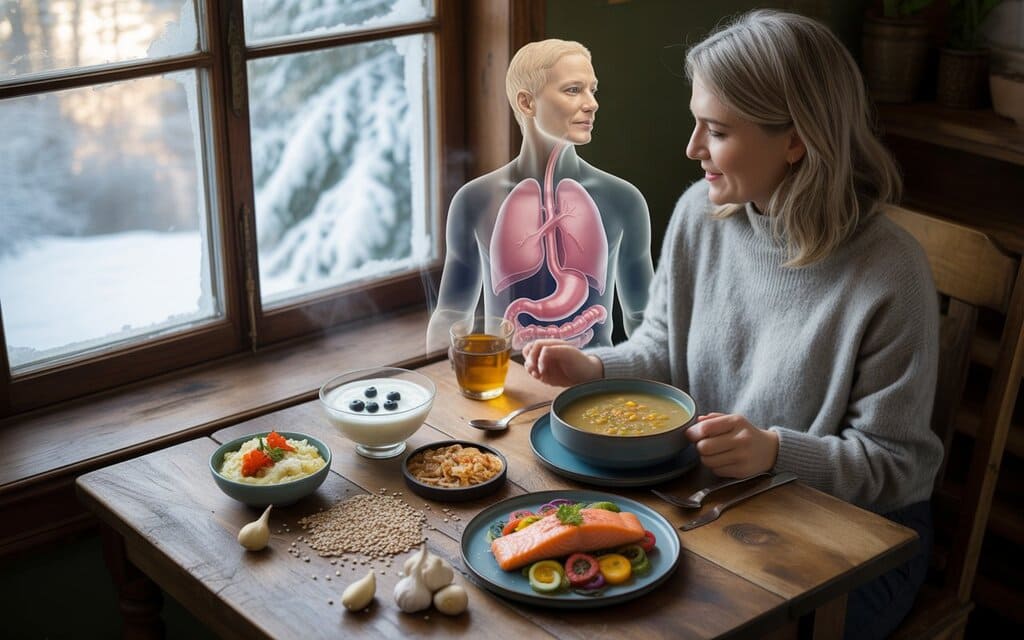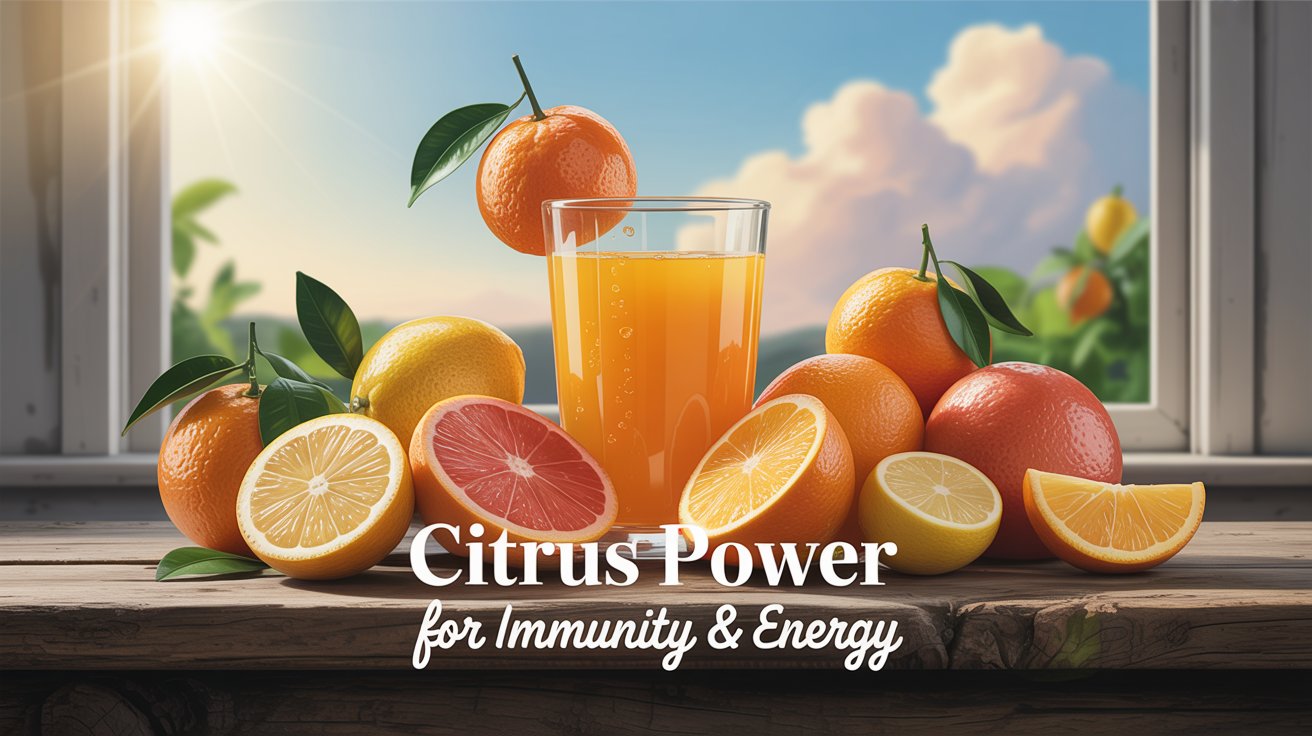
Introduction
When the weather shifts quickly—cool mornings, warm afternoons, rainy spells—our bodies face repeated immune challenges. In these unstable weather periods, maintaining a resilient immune system and steady energy levels becomes essential. One of the simplest, most affordable strategies is to include more citrus fruits in your daily diet. Citrus (oranges, lemons, grapefruits, tangerines, limes) are rich sources of vitamin C, helpful antioxidants, and bioactive flavonoids such as hesperidin that together support the body’s defense systems and help reduce oxidative stress. This article explains how citrus fruits support immunity and energy, summarizes recent scientific findings from Asia, Europe, and the Americas, offers practical serving suggestions, and provides a quick-reference table of vitamin C amounts and daily targets. PMC+1
Key Points
- Vitamin C supports barrier integrity, leukocyte function, and antioxidant protection. PMC
- Regular dietary intake of citrus provides immediate vitamin supply plus polyphenols (like hesperidin) that may reduce inflammation. PMC
- Randomized trials and meta-analyses indicate vitamin C can shorten the duration and reduce severity of common colds, particularly in severe cases. PMC
- Whole fruits and 100% juices deliver additional nutrients (folate, flavonoids) that supplements alone may not provide. PMC
- Recommended daily intake: about 75 mg for adult women and 90 mg for adult men (higher in smokers and during some illnesses); many citrus servings meet or exceed this. Linus Pauling Institute+1
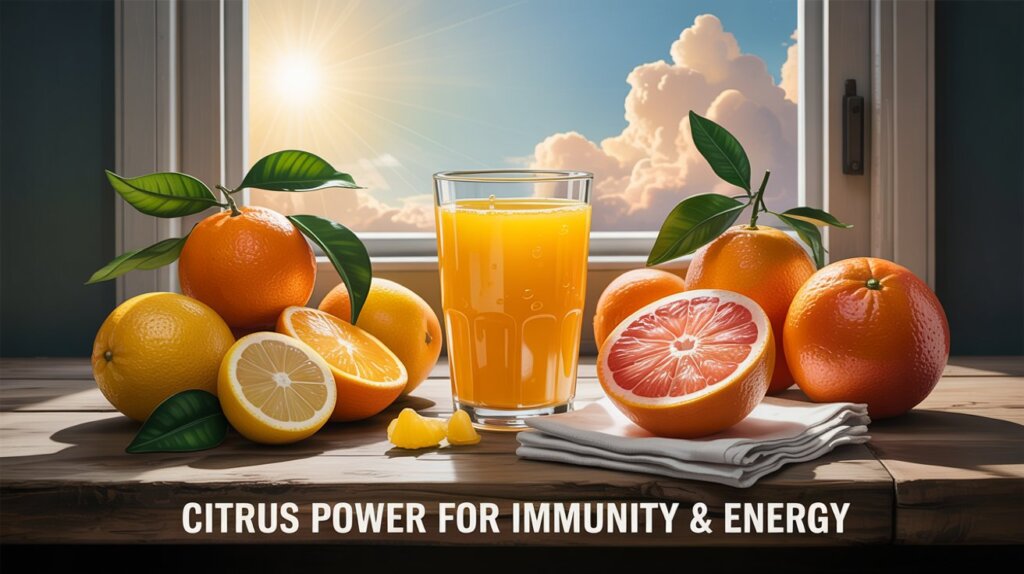
The Science : How Vitamin C and Citrus Support Immunity
1. Barrier protection and immune cell function
Vitamin C helps maintain the integrity of physical barriers (skin and mucous membranes) that keep pathogens out. It accumulates in immune cells (neutrophils, lymphocytes) and supports their motility, chemotaxis, phagocytosis, and microbial killing. These mechanisms are well-documented in laboratory studies and reviews of immune function. In short: vitamin C strengthens both the first line (barriers) and the second line (cellular immunity) of defense. PMC+1
2. Antioxidant and anti-inflammatory effects
Unstable weather often triggers intermittent infections and inflammatory responses. Vitamin C is a powerful antioxidant that neutralizes reactive oxygen species generated during immune responses, protecting cells from damage and helping to resolve inflammation. Citrus fruits also contain flavonoids (e.g., hesperidin, naringin) that have anti-inflammatory and vascular benefits in human and animal studies, amplifying the protective effect of vitamin C from whole foods. PMC+1
3. Clinical evidence: respiratory infections and symptom reduction
Clinical trials and meta-analyses suggest vitamin C supplementation can shorten the duration and reduce the severity of the common cold—especially in people experiencing higher physical stress or with severe symptoms. Recent meta-analyses reviewing randomized controlled trials across multiple regions concluded measurable benefits in recovery time and severity metrics. This does not mean vitamin C prevents every infection, but it does support faster resolution and milder courses in many studies. PMC+1
4. Energy, fatigue, and cognitive effects
Vitamin C participates in synthesizing neurotransmitters (e.g., norepinephrine) and in mitochondrial function. Clinical and observational studies link low vitamin C status to increased fatigue and lower quality-of-life measures; restoring adequate vitamin C (often through diet) can improve subjective energy and reduce fatigue in some populations. Therefore, citrus intake can contribute to a feeling of increased natural energy during unstable or stressful weather. MDPI+1
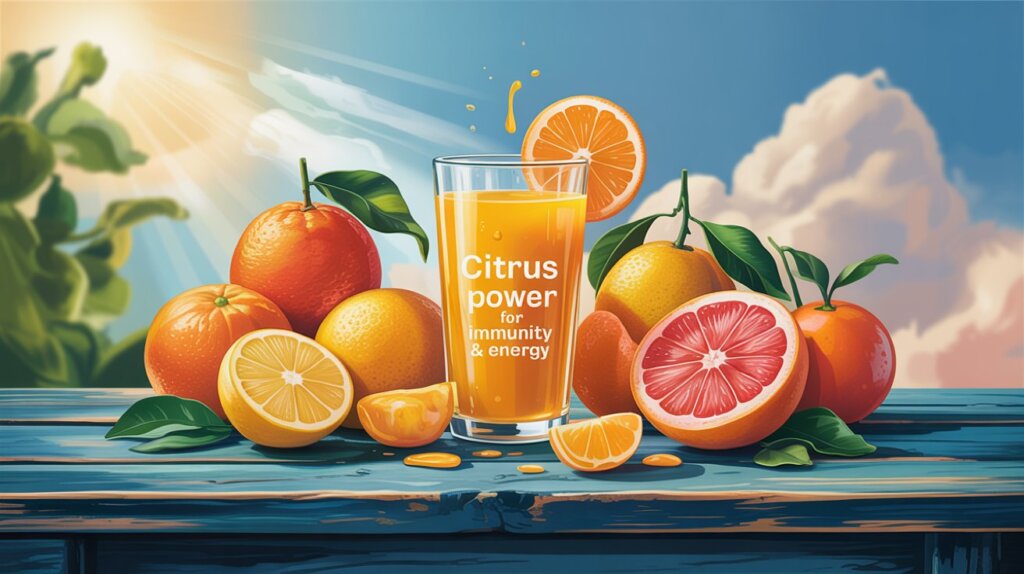
Citrus vs. Supplements : Why whole fruit matters
Whole citrus fruits and 100% juices are not just carriers of ascorbic acid (vitamin C); they also supply folate, potassium, fiber (in whole fruit), and polyphenols (flavonoids). These companion nutrients work synergistically: for example, folate supports cellular repair, fiber supports gut health (a key part of systemic immunity), and flavonoids add anti-inflammatory actions. Reviews comparing whole-food sources to isolated supplements recommend dietary sources as first-line for routine immune support, reserving high-dose supplements for specific clinical indications under supervision. PMC+1
Practical Guide : How much citrus and when?
Daily targets and servings
The U.S. recommended daily intake (RDAs) for vitamin C are roughly:
- Adult women: ~75 mg/day
- Adult men: ~90 mg/day
Smokers require an additional ~35 mg/day; older adults and some clinical situations may call for higher intake. A single medium orange or a cup of 100% orange juice often supplies most or all of the RDA. Linus Pauling Institute+1
Quick table : Vitamin C in common servings (approximate per serving)
Source: USDA / FoodData Central (national nutrient data). Values are approximate and vary by cultivar and ripeness. fdc.nal.usda.gov+1
| Food (typical serving) | Approx. Vit C (mg) |
|---|---|
| Orange, 1 medium (≈130 g) | ~70 mg |
| Orange juice, 1 cup (240 ml) | ~80–95 mg |
| Grapefruit, 1/2 medium | ~30–40 mg |
| Lemon, juice from 1 medium | ~20–30 mg |
| Tangerine / clementine, 1 fruit | ~30–40 mg |
| Kiwi, 1 medium | ~60–90 mg |
| Strawberries, 1 cup sliced | ~80–100 mg |
(Use whole fruit where possible to gain fiber; juices are convenient but may concentrate sugars—choose 100% juice with no added sugar.) Bureau des Suppléments Alimentaires+1
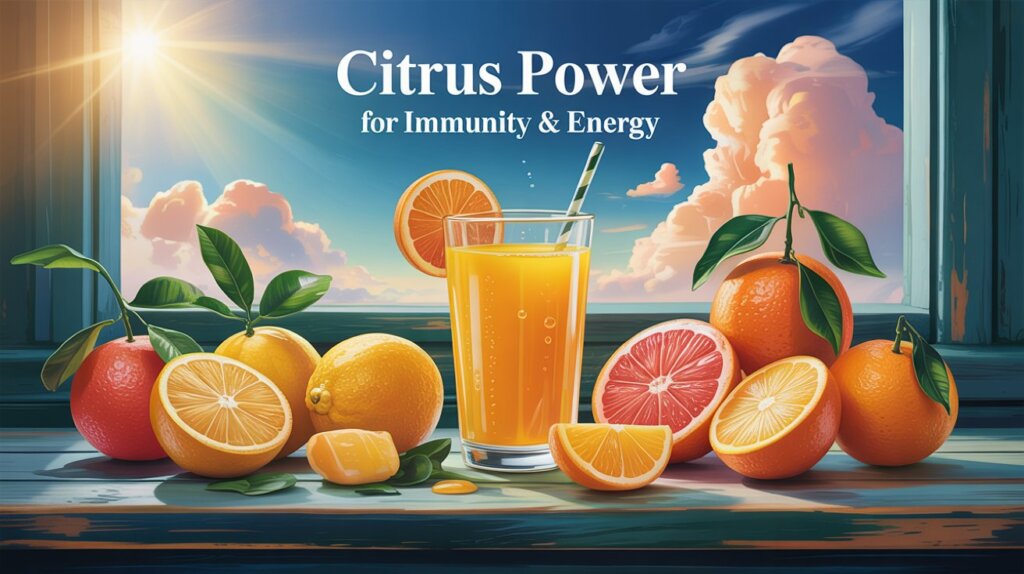
Recipes and timing (simple ideas for unstable weather)
- Morning boost: Squeeze half a lemon into warm water + a small whole orange on the side.
- Midday smoothie: Orange + kiwi + handful of spinach + plain yogurt — boosts vitamin C and adds protein.
- Snack: A bowl of mixed citrus sections (orange, grapefruit, tangerine) with a sprinkle of chopped mint.
- Pre- or post-workout: 1 cup 100% orange juice (diluted if desired) helps restore fluids and provides quick vitamin C and carbohydrates.
Safety, dosing limits, and special populations
Vitamin C is water-soluble; excess is usually excreted, but very high doses (grams per day) can cause gastrointestinal upset and, rarely, kidney stones in predisposed individuals. For most people, obtaining vitamin C from citrus and other fruits/vegetables is safe and effective. High-dose therapeutic use (multi-gram IV or oral) should be managed by clinicians and is investigated in specific conditions (e.g., severe infections, some trials in COVID-19), but routine high-dose use is unnecessary for general seasonal protection. PubMed+1
Recent research highlights (Asia, Europe, Americas)
- A European review of citrus fruit juices and bioactives summarized roles for vitamin C, folate, and citrus flavonoids (hesperidin, narirutin) in supporting immune barrier function and moderating inflammation. The review emphasized whole-juice benefits beyond isolated vitamin C. PMC
- Foundational immunology reviews (Carr & Maggini and others) describe how vitamin C concentrates in leukocytes and modulates functions such as phagocytosis and chemotaxis—work conducted and synthesized by researchers across Europe and the U.S. PMC
- Meta-analyses of randomized trials show vitamin C shortens cold duration and lessens severity—evidence summarized in major updates through 2023 and 2024. Effects are most clear for duration and severity, especially in more severe cases or physically stressed groups. PMC+1
- Recent comprehensive reviews (2024–2025) emphasize maintaining adequate dietary vitamin C as part of a balanced strategy for infection resilience and energy, and highlight ongoing clinical trials exploring therapeutic uses in acute disease. ScienceDirect+1
Conclusion
In unstable weather—when colds and seasonal infections spike and energy dips—citrus fruits are a practical, evidence-supported tool to help strengthen immunity and support natural energy. Whole citrus and 100% juices deliver vitamin C, folate, flavonoids, and other nutrients that act together to preserve barrier integrity, support immune cells, reduce oxidative stress, and help you feel less fatigued. While supplements and high-dose clinical uses have a place in specific settings, daily servings of citrus (an orange, a glass of 100% orange juice, or a mix of citrus segments) are an easy, tasty, and safe first step.
Eat a variety of fruits and vegetables, stay hydrated, get regular sleep and moderate exercise, and include citrus regularly—especially during sudden weather changes—to give your body the nutritional tools it needs to stay resilient. PMC+1
References (selected)
- Miles EA, et al. Effects of Citrus Fruit Juices and Their Bioactive Components on Inflammation and Immunity: A Review. Frontiers / PMC. 2021. PMC
- Carr AC, Maggini S. Vitamin C and Immune Function — Review. Nutrients (review and mechanistic summary). 2017. PMC
- Hemilä H. Vitamin C reduces the severity of common colds: a meta-analysis. 2023. (Systematic review/meta-analysis). PMC+1
- Linus Pauling Institute (Oregon State University). Vitamin C overview — immune-specific roles and guidance. Linus Pauling Institute
- U.S. Department of Agriculture — FoodData Central / National Nutrient Database: vitamin C tables and food values. fdc.nal.usda.gov+1
- Office of Dietary Supplements (NIH). Dietary Supplements and Immune Function — Fact Sheet. 2025 update. Bureau des Suppléments Alimentaires
- See XZ. A comprehensive review and recent advances of vitamin C. 2024 review (ScienceDirect). ScienceDirect
- Alberts A, et al. Vitamin C: A Comprehensive Review of Its Role in Health. MDPI. 2025. MDPI
